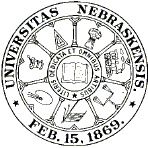
University Studies (University of Nebraska) (1888–1984)
Date of this Version
7-1906
Citation
UNIVERSITY STUDIES. Vol. VI, No. 3, JULY 1906
Abstract
The following investigation deals with the comparison of adverbs in English in the fourteenth century. This century seems especially important in the history of adverb comparison, since it represents the close of the dialectal period and the beginning of the transition period from Middle to Modern English. A chief purpose has been to connect the adverbial forms of the fourteenth century with those of the preceding and following centuries.
Examples are very full but not exhaustive. The majority of the important literary monuments of the century have been examined. The examples, however, are fuller for the Northern and Midland than for the Southern dialects. The great variety of forms for the comparative and superlative of adverbs is due to many conditions, a brief survey of which seems necessary for a complete understanding of these forms.
The two and a half centuries, following the close of the Old English period, in which there was no standard tongue, was a period of marked growth for the English language. Forms, spellings, sounds, and meanings, which are constantly shifting in any living language, developed rapidly. By the close of the thirteenth century the dialects had become, so intensely local that there was no English which could be understood both at Durham and at Exeter. The North, the first to level and drop inflectional endings, differed materially from the South, which was very conservative in this respect. Midland dialects, situated between the North and the South, show the influence of both.
Included in
Comparative and Historical Linguistics Commons, Literature in English, British Isles Commons, Other Linguistics Commons


Comments
Published by the University of Nebraska